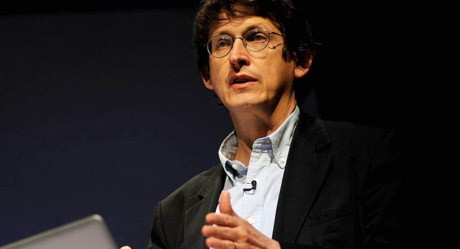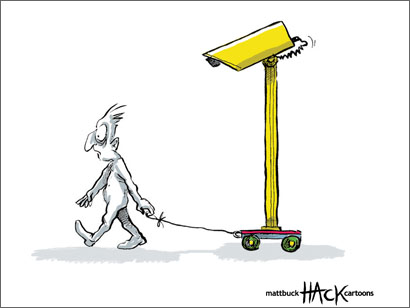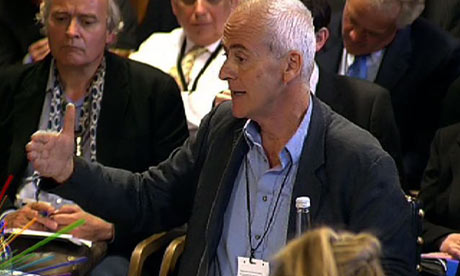The News of the World phone-hacking scandal was once again in the spotlight last night, this time at City University where reporters, lawyers, a former tabloid editor and a victim of the NotW’s close attention gathered to debate the question: “How far should a reporter go? The lessons of the News of the World phone-hacking story.”
Former News of the World deputy features editor Paul McMullan spoke largely in defence of the newspaper and its practices, revealing that he had been contacted three times by the Metropolitan police following his recent admission of illegally obtaining information while at the newspaper.
McMullan is one of a string of former NotW staff to confess to phone-hacking, both on the record and anonymously, and allege that the practice was widespread at the newspaper. He admitted last night that he had illegally hacked voicemail accounts, bank accounts and medical records for an investigation into cocaine smuggling.
Appearing alongside McMullan were: former Daily Mirror editor Roy Greenslade, who elected to speak on behalf of the NotW in the absence of a senior figure from the newspaper; former director of public prosecutions Sir Ken Macdonald; Guardian reporter Nick Davies, who broke the story initially and has reported on it extensively; former head of the FIA Max Mosley, who won record damages of 60,000 from the newspaper in a privacy action, and defamation lawyer Mark Lewis, who has represented many of those claiming damages from the NotW after the scandal. The debate was chaired by Andrew Caldecott QC.
Guardian reporter Nick Davies began by apologising to the NotW for “saying some beastly things about it” and said they were unlucky to get caught out in an industry-wide practice
I should start off by apologising to the NotW, in a way I feel sorry for them. It’s sheer fluke and bad luck that that particular newspaper is the subject of all this attention. It’s just because one journalist Clive Goodman got caught hacking the voicemail not of an ordinary punter but of the royal family. All of us with our headlights on know very well that this illegal activity was going on in most Fleet Street newsrooms.
Davies even drew attention to the naming of the Guardian’s sister paper the Observer by the Information Commissioner’s report on obtaining of phone records. But despite his apologies he was unequivocal in his distaste for the phone-hackers: “I’ve had enough. Even though I’m a reporter I want a law to protect me from these creatures. These people have no business in our phone calls, they have no business in our bedrooms.”
Davies did however speak out in support of a law which would give reporters additional powers to hack into telephones and voicemail accounts where there was a demonstrable public interest.
What we’ll discover as we go through this evening is that a lot will cluster around two simple words, ‘public interest’ (…) I would go so far as to say I would like to see a change in the law to allow journalists to intercept voicemail messages if it’s in the public interest. The huge problem is that nobody knows where the boundaries of that concept are.
Well, as Roy Greenslade pointed out in his terrifically acted (if somewhat comical) turn defending the NotW, “What is the public interest to the Guardian and the Observer is very different when you reach the celebrity agenda of the Sun and the NotW.”
Paul McMullan clearly has a very different concept of public interest to Nick Davies and especially to Max Mosley, with whom he repeatedly clashed. McMullan said, in answer to “How far should a reporter go?” that “if you want to get ahead in journalism you have to go as far as you possibly can, there is no limit”.
I think privacy is the thing we really have to fight against, privacy is the place where we do bad things. We hide our misdemeanors embarassments and things we wouldn’t want to have to tell our wives and children we were up to and then we say privacy, it’s my private life, I can break my marital contract, I can have a completely false public perception when actually, I’m a grubby little sinner.
Mosley, on the other hand, is clearly more of a fan of the French way of doing things. He claimed throughout that the private lives of public figures have no bearing on their public life, dismissing McMullan’s notion that there was a legitimate public interest in reavealing the private actions of those who presented themselves as family men, or who were said to be role models.
…there is this mad argument ‘oh we should expose Tiger Woods or Mr [John] Terry because they tell the world they are great family men and they’re not. This is the idea that people go to watch John Terry play football or Tiger Woods pay golf, and they say to themselves ‘why am I going to see him, oh because he’s a wonderful family man’. It’s so absurd.
Mosley was very firm in his belief that jounalists should not be able to get away with breaking the law because they decide it serves the public interest. Defamation lawyer Mark Lewis pointed out that if the police want to tap somebody’s phone they have to approach the home secretary first for permission, with prima facie evidence, and not just go on a “fishing expedition” if they so decide.
Sir Ken Macdonald, former director of public prosecutions, countered that their argument was “too simplistic”, arguing that without journalists bending, or perhaps breaking the law, a huge number of important public interest stories would not have been published. Macdonald also expressed concern about allowing public figures to live “entirely parallel lives”, which he said could lead journalists to “an attitude of deference to those in power and to cultural elites”.
His comment prompted an audience member to ask whether a hypothetical story about David Cameron being caught with call girls had legitimate public interest. Given what this information would tell us about the judgement of the country’s prime minister in opening himself up to bribery and coercion, Nick Davies was surprisingly unsure whether he thought this constituted public interest.
Repeatedly mentioned of course was Cameron’s director of communications and former NotW editor Andy Coulson. Last night’s Dispatches documentary featured a former senior NotW journalist claiming, anonymously, that the former editor had listened to hacked voicemail messages. Coulson has continually denied any knowledge of phone-hacking, despite recent accusations in the New York Times that he sanctioned the practice. Roy Greenslade, in his role as the newspaper’s defender, sounded quite convinced in his support of Coulson, inparticular Coulson’s claim that he wouldn’t neccessarily have known or even asked about the provenance of stories. According to Greenslade:
Editors don’t have to know every intimate detail on this occasion I don’t think he did (…) A lot of people here will say ‘of course he knew’, but it seems perfectly feasible to me that you don’t neccessarily know every detail about the methodology.
The panelists debated various possible ways of negotiating the difficult terrain between freedom of the press and privacy, with Max Mosley calling for the law to require prior notification on issues which the subject of the story might not want publicised. Mosley’s strict position was largely dismissed by the journalists present, who saw the extent to which it could compromise a free press. Nick Davies suggested a variation on the idea, in which editors could approach a “council of wise men” who (quite who was never clarified) could arbitrate and advise on publication, with their recommendation taken in to account if the editor was challenged post-publication.
The risk all these possible regulatory measures pose to freedom of the press was articulated of course, leaving the panel not much closer to a workable solution to the problem by the end. But it was a spirited debate which generated decent conversation about some of the issues at the heart of the phone-hacking scandal and well-demonstrated the difficulty of satisfying both the need for freedom of the press and the need for privacy.


